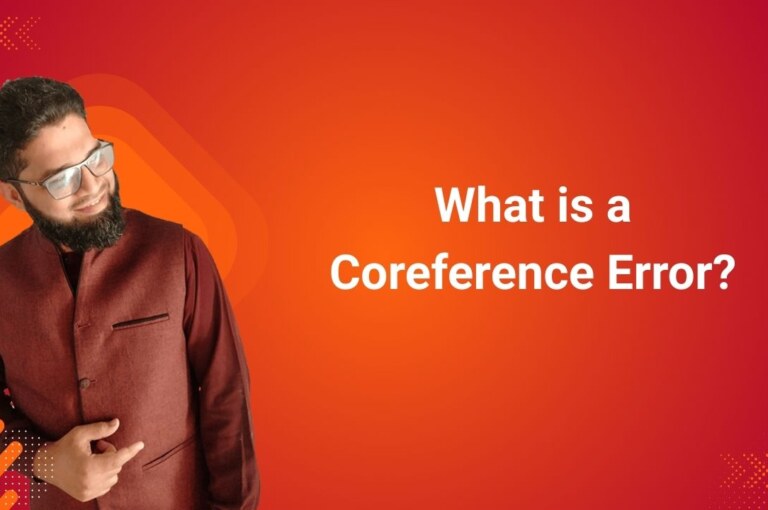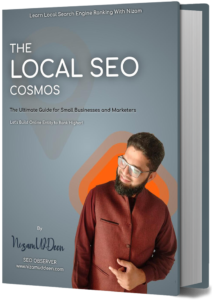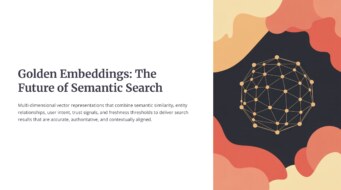In the semantic web and NLP-driven SEO ecosystem, coreference is a silent but vital mechanism that holds meaning together. It determines whether “Alice,” “she,” and “the writer” are recognized as the same entity. When this mapping fails, we get a coreference error — a breakdown that distorts meaning, misguides entity recognition, and weakens search visibility across knowledge systems.
A single ambiguous “it” can fragment your entity graph, mislead retrieval models, and corrupt knowledge-based trust signals. That’s why understanding and fixing coreference errors is no longer just a linguistic exercise — it’s central to maintaining semantic integrity and topical authority in content optimization.
Understanding Coreference in Context
At its core, coreference occurs when multiple linguistic expressions refer to the same real-world entity.
Example: “Sarah Teach joined the review. She explained her concept.”
Both expressions point to one entity — Sarah Teach.
In linguistic terms, the first mention (“Sarah Teach”) is the antecedent, while the second (“she”) is the anaphor. The relationship between them forms a coreference link.
When that link is broken or misinterpreted, meaning disintegrates — for humans and for algorithms performing information retrieval.
Modern semantic search engines rely on precise coreference resolution to maintain contextual continuity between mentions. It enables better semantic relevance and ensures that ranking systems understand entity identity rather than surface wording.
Definition of a Coreference Error
A coreference error occurs when pronouns, noun phrases, or referring expressions are incorrectly linked — either to the wrong entity (overlinking) or to no entity at all (underlinking).
In NLP, this error disrupts entity continuity, breaking down the chain that algorithms use to infer who or what is being discussed.
In SEO writing, this manifests as ambiguous “he,” “it,” or “they” statements that confuse both readers and crawlers, diluting contextual clarity and topical consolidation.
Types of Coreference Errors
Wrong Link: A pronoun attaches to the wrong entity.
Missed Link: Mentions that should be connected aren’t grouped together.
Non-referential Link: Linking expletive “it” (as in “It is raining”) to an entity.
Entity/Event Confusion: Linking events to entities (e.g., “The lawsuit was expensive” vs “The company was expensive”).
Split Antecedent Mislink: “John scolded Ali because they…” (ambiguous plural reference).
When compounded across paragraphs, these small mislinks pollute the document’s semantic structure, affecting its interpretability by large-scale systems like passage ranking.
A Practical Example of Coreference Error
“Barry Schwartz performed a review with Sarah Teach from Motley Fool, and she used a term called ‘Heartfelt SEO’ in the review.”
In this case:
“Barry Schwartz” = Male (assumed)
“Sarah Teach” = Female
Pronoun “she” = refers clearly to Sarah Teach.
If both names were female (e.g., “Barry” being a woman), the pronoun “she” would become ambiguous — causing a potential coreference error.
For both humans and NLP systems, this ambiguity obstructs accurate reference resolution.
Ambiguity doesn’t just cause grammatical confusion — it causes semantic drift, where the wrong entity inherits attributes, polluting the connected knowledge graph.
How to avoid it:
Replace pronouns with explicit names when multiple entities appear.
Keep antecedents close to their pronouns to preserve proximity-based cues, a principle tied to proximity search.
Use contextual titles (“reviewer Sarah Teach”) for clear reference signals.
Why Coreference Errors Matter in NLP?
In Natural Language Processing, resolving coreference accurately ensures that downstream tasks — such as summarization, question answering, and machine translation — operate on correct semantic links.
Without resolution:
Information extraction systems may misassign facts (e.g., “he” → wrong CEO).
Machine translation may produce incorrect gendered or contextual pronouns.
Entity disambiguation within search pipelines can fail, harming retrieval precision.
Neural architectures such as End-to-End Coreference Models and SpanBERT have significantly improved link accuracy through deep contextual embeddings — a leap made possible by sequence modeling and contextual representations. These models treat entire text spans as candidate mentions, improving contextual awareness beyond word-level semantics.
Despite this, even modern LLMs still commit coreference errors on adversarial datasets (like Winograd schemas), underscoring the need for explicit linguistic clarity in SEO-driven writing.
How Coreference Errors Affect Semantic SEO?
Coreference is not just a linguistic challenge — it’s an SEO architecture problem.
Entity Graph Pollution:
When a pronoun refers ambiguously, the algorithm links attributes to the wrong node within your semantic content network. This breaks entity alignment across your structured data markup.Signal Fragmentation:
When a brand or product name is replaced repeatedly with “it,” crawlers may treat these as distinct entities, weakening ranking signal consolidation.Knowledge Discontinuity:
Broken chains of reference create incoherent document embeddings. This reduces semantic similarity between your page and the query intent, affecting retrieval quality.Reduced Update Score:
Fragmented or ambiguous entity mentions diminish freshness signals and consistency of the update score, which search engines evaluate as part of trustworthiness metrics.
Maintaining clean reference chains strengthens semantic clarity, user comprehension, and search engine trust simultaneously.
Mechanisms of Coreference Resolution
Modern NLP systems use a combination of mention detection, span embedding, and antecedent scoring to handle coreference tasks. The process involves:
Candidate Extraction
Every potential mention (noun phrase or pronoun) is extracted using syntactic and positional cues.Contextual Encoding
Each mention is embedded through contextual embeddings, capturing meaning within the entire passage.Antecedent Scoring
Models compute similarity scores to predict which earlier mention each pronoun refers to, using span-level semantic similarity metrics.Clustering
Mentions are grouped into entity clusters — each cluster representing one real-world entity.
Errors at any of these steps result in mislinks, producing coreference errors that cascade into fact extraction, ranking evaluation, and even E-E-A-T alignment.
Linguistic Roots and Modern Evolution
The concept of coreference traces back to formal semantics and truth-conditional linguistics, where meaning was modeled by identifying the conditions under which a sentence is true. This lineage connects to ideas covered in truth-conditional semantics and compositional semantics.
Today, machine learning extends these linguistic theories through transformer-based architectures like BERT and LaMDA, which embed referential context within semantic embeddings.
Yet, ambiguity persists whenever input text lacks clarity or structural disambiguation — reinforcing the human author’s role in ensuring syntactic precision.
How Coreference Errors Corrupt Entity Understanding?
Search engines build knowledge through entity disambiguation and graph alignment. When pronouns and referring expressions are unclear, entities get incorrectly merged or split across your knowledge graph.
Example of Semantic Drift
“Google updated its system, and it improved site visibility.”
If “it” ambiguously refers to Google or the system, machine parsers might misattribute improvement signals to the wrong entity — corrupting your entity graph and weakening contextual hierarchy.
In semantic content networks, this mislinking breaks contextual borders and lowers entity salience, diluting the weight your main entity contributes to topical authority. Maintaining precise reference chains ensures stronger knowledge-based trust and E-E-A-T alignment.
Evaluation Metrics and Error Analysis in NLP
In computational linguistics, coreference resolution systems are measured using three interrelated metrics:
MUC (Mention-based Unlinking and Counting) — evaluates how many link edges a system correctly predicts.
B³ (Bagga & Baldwin) — assesses precision and recall over mention clusters.
CEAF φ₄ (Constrained Entity Alignment F-score) — rewards correct one-to-one entity alignments.
The average of these scores forms the CoNLL F1 benchmark, the global standard for evaluating models such as SpanBERT, Longformer, and end-to-end coreference systems used in modern information retrieval pipelines.
Why it matters for SEO: these metrics directly correlate with how search engines understand context boundaries within your content. High-performing language models trained on such metrics reduce mislinking of brand or product references — improving your ranking signal consolidation.
Bias and Fairness in Coreference Systems
A hidden source of coreference error is bias — often gendered or occupational. For instance, models trained on unbalanced corpora may resolve “the nurse… she” or “the engineer… he” by stereotype rather than syntax.
To counter this, NLP research introduced WinoBias and WinoGrande datasets that stress-test model fairness. These reveal that even state-of-the-art LLMs inherit biases from training data.
In SEO writing, bias manifests when pronouns consistently favor one gender or entity type. Editors can mitigate this by:
Using role + name constructs (e.g., “Engineer Aisha Rizvi explained…”).
Avoiding unnecessary gender cues unless contextually relevant.
Reviewing output with bias-aware editing workflows.
These editorial adjustments support inclusive communication and cleaner entity alignment inside the semantic content network.
Advanced Coreference Failures and Their SEO Impact
| Failure Type | Description | SEO Consequence |
|---|---|---|
| Over-linking | Multiple distinct entities are merged into one cluster. | Loss of entity differentiation within the entity graph. |
| Under-linking | The same entity is split into multiple clusters. | Fragmented context lowers semantic similarity scores. |
| Event-Entity Confusion | Mixing processes and objects (“launch” ↔ “product”). | Misattributed schema markup and E-E-A-T loss. |
| Non-referential “it” | Expletive “it” treated as real referent. | Broken structured data relationships. |
Each failure cascades into weaker contextual coherence, lower update scores, and reduced algorithmic confidence in your brand’s expertise.
Editorial Framework to Eliminate Coreference Errors
1. Structural Precision
Keep pronouns within one or two sentences of their antecedents.
Segment content using strong H2/H3s to preserve contextual flow and avoid cross-referencing ambiguities.
2. Schema and Markup Reinforcement
Use Schema.org for Entities to help search engines confirm identity chains between textual mentions and structured data attributes.
3. Lexical Optimization
Reinforce identity via partial repetitions: “Sarah Teach, the reviewer,” rather than simply “she.”
This mirrors proximity search principles, strengthening retrieval precision.
4. Content Review Pipeline
Integrate a coreference QA step into your editorial checklist:
Highlight every pronoun.
Confirm referent clarity.
Replace or restructure ambiguous chains.
A periodic audit, much like an SEO site audit, ensures semantic health across your content corpus.
Machine Learning and SEO Synergy
Advanced retrieval systems like DPR (Dense Passage Retriever) and BM25 + Hybrid Ranking combine dense and sparse representations. Their success depends on clean, unambiguous referents within passages.
Coreference errors weaken vector coherence and lower the efficiency of dense vs. sparse retrieval models. For semantic SEO teams, this means ambiguous writing directly undermines machine comprehension and click-model accuracy during ranking evaluation.
Consistent referents, clear entity roles, and updated factual mentions maintain your content’s compatibility with evolving neural retrieval systems.
Coreference and Knowledge-Based Trust
Search engines assess content credibility not only through backlinks but also through internal factual consistency — a principle central to knowledge-based trust.
If a page alternates between “Google,” “it,” and “the company” without precision, factual statements risk being indexed under separate nodes, eroding cumulative trust.
By maintaining explicit references and clear pronoun resolution, authors preserve factual alignment and strengthen knowledge integrity, one of the foundational pillars of semantic authority.
Frequently Asked Questions (FAQs)
Why are coreference errors critical for SEO?
Because they fragment meaning, mislead entity understanding, and lower contextual cohesion, which search engines interpret as reduced content quality and trust.
Can transformers like BERT fully resolve pronouns?
Not perfectly. Even contextual models still fail on adversarial cases; explicit referents remain essential for clarity.
How do I detect coreference errors in my writing?
Perform a pronoun-trace audit. If any “it,” “she,” or “they” could refer to more than one noun in the last two sentences, you have potential ambiguity.
Does structured data fix coreference issues automatically?
Structured data reinforces identity but cannot repair linguistic ambiguity inside text. Both layers must align.
What metrics indicate improvement?
Reduced ambiguity per article, higher semantic similarity scores in internal tools, and better entity cohesion in your topical map.
Final Thoughts on Coreference Error
Coreference integrity is the unseen foundation of semantic SEO. Each clear referent acts as a signal of expertise; each ambiguous pronoun erodes it.
Writers must blend linguistic precision with technical reinforcement — aligning syntax, schema, and semantics so machines and humans share the same interpretation.
When your entity chains remain unbroken, your content forms a unified semantic graph that search engines can trust, rank, and reward.
Want to Go Deeper into SEO?
Explore more from my SEO knowledge base:
▪️ SEO & Content Marketing Hub — Learn how content builds authority and visibility
▪️ Search Engine Semantics Hub — A resource on entities, meaning, and search intent
▪️ Join My SEO Academy — Step-by-step guidance for beginners to advanced learners
Whether you’re learning, growing, or scaling, you’ll find everything you need to build real SEO skills.
Feeling stuck with your SEO strategy?
If you’re unclear on next steps, I’m offering a free one-on-one audit session to help and let’s get you moving forward.
Download My Local SEO Books Now!
Table of Contents
Toggle






Leave a comment